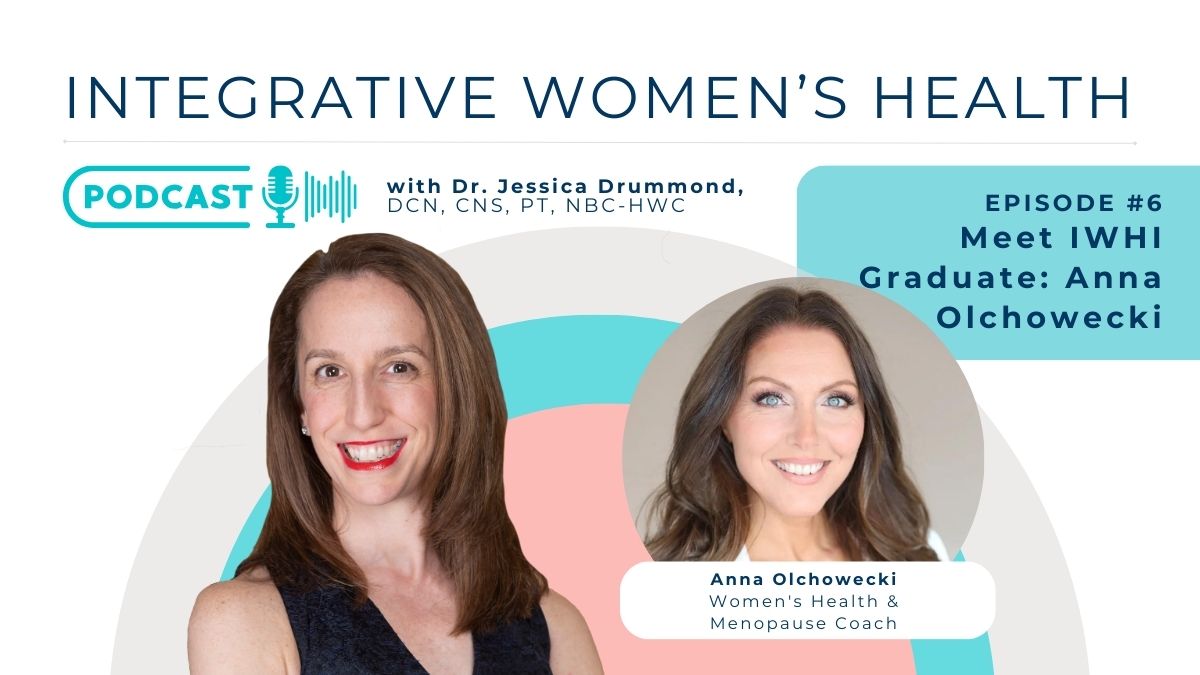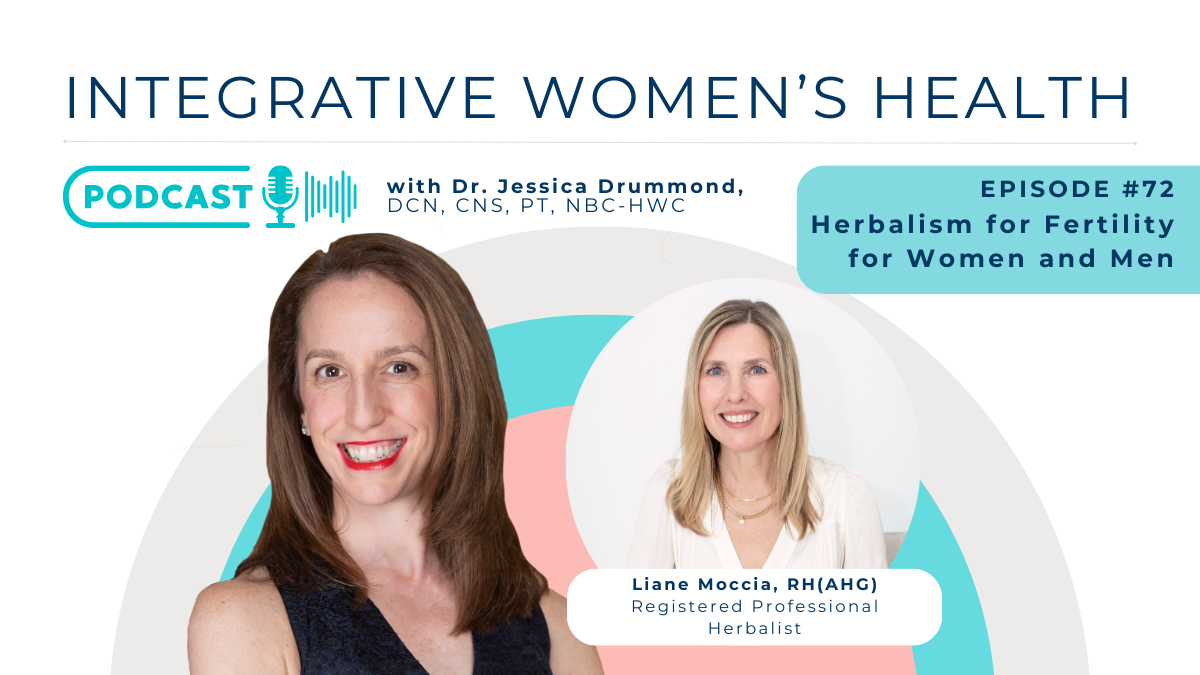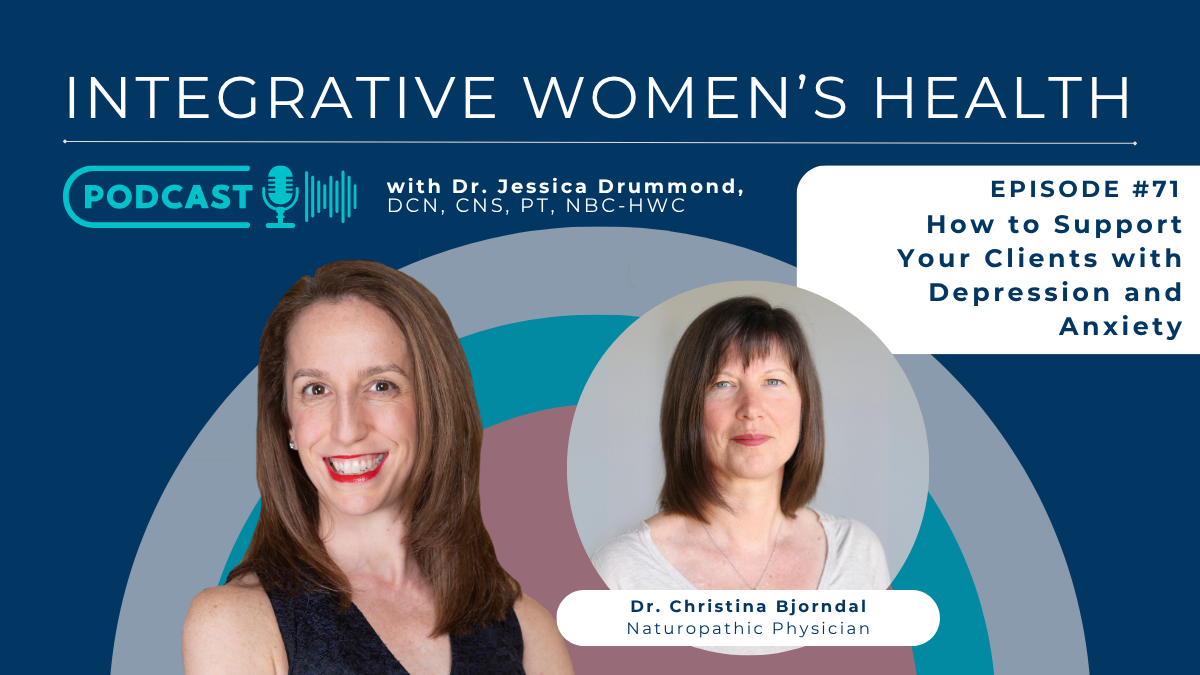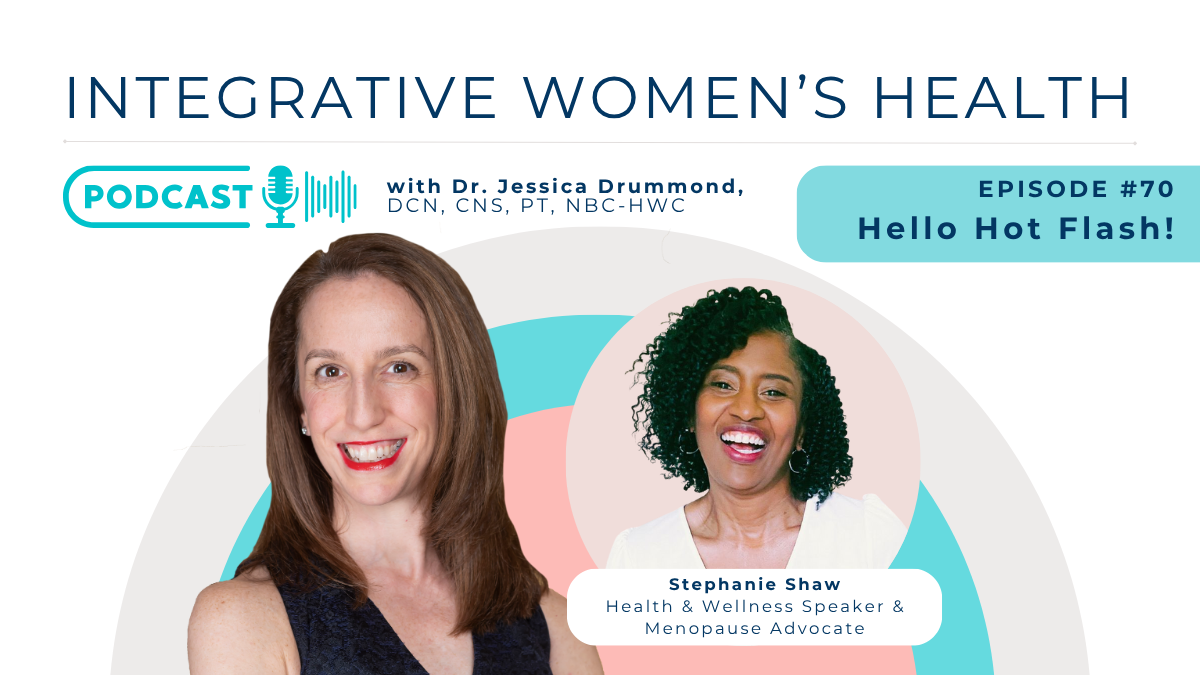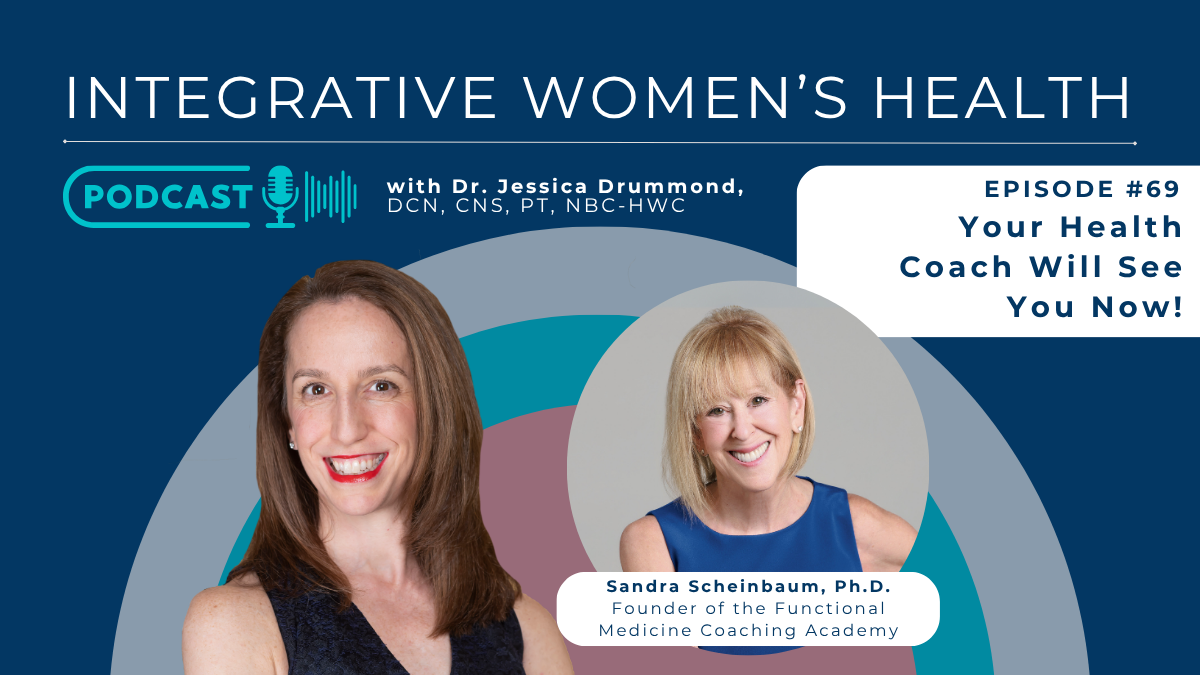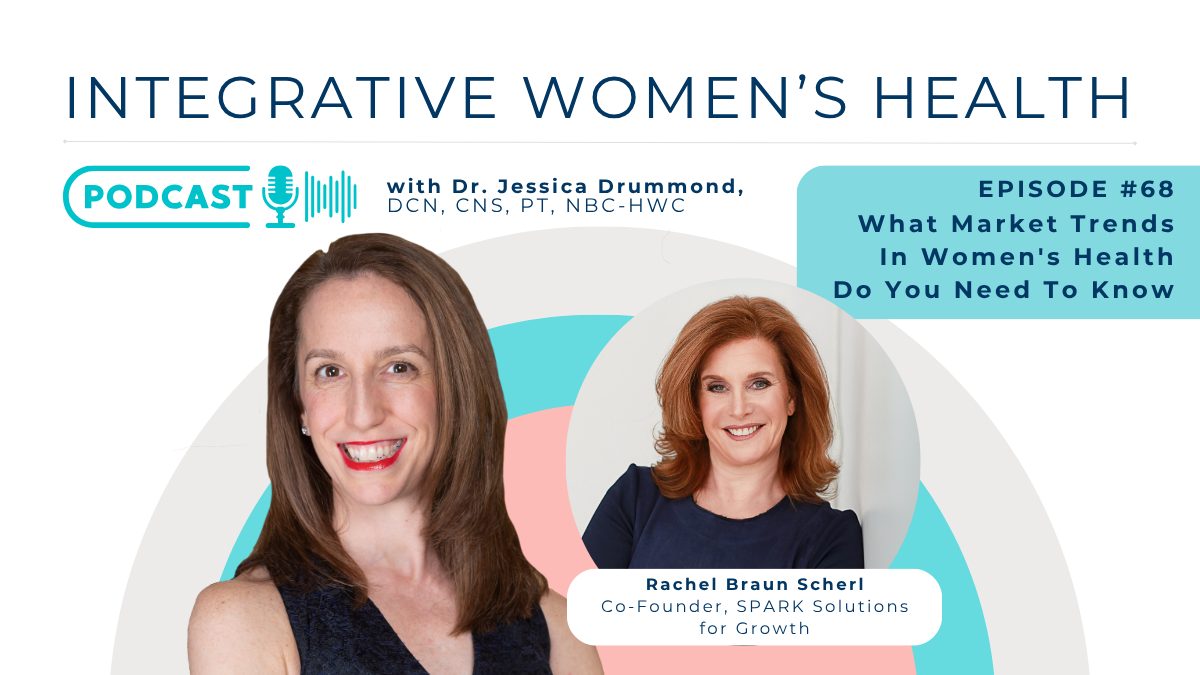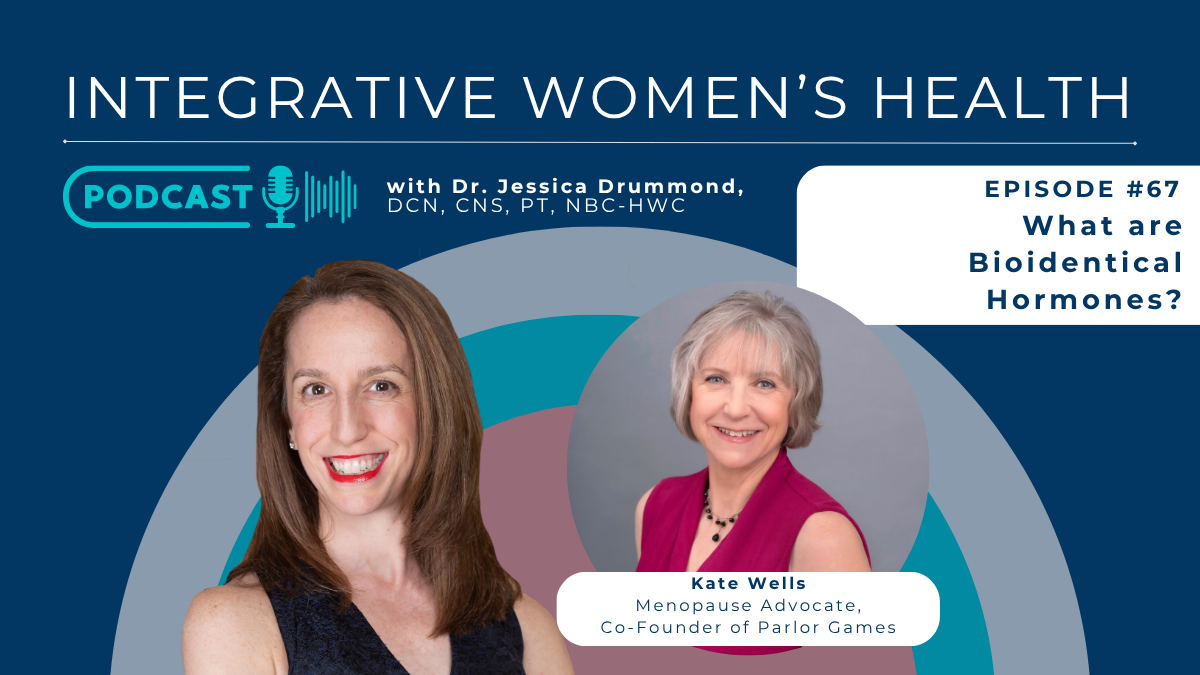Follow Us for Free:
About the episode
“To be able to serve women and bridge that gap so you don’t have to access the healthcare system if you don’t need to has been a beautiful transition for me.” – Anna Olchowecki
Have you ever felt like you wanted to do more in your career?
There are many factors to consider when making the decision to change your career, follow your passion, and embrace new beginnings. That’s why it’s so valuable to hear from others who have been where you are and learn about their journey and lessons along the way.
Today, I’m excited to introduce you to our Women’s Health Coach graduate, Anna Olchowecki. Anna is a nurse in Canada who came from what she calls the crisis medical system. After 20 years of practicing as an RN, she wanted to focus more on preventative care and optimizing health for women in perimenopause and menopause.
Through the program, Anna found a global community of supporters along with the resources she needed to make her career transition and grow a practice she’s excited about. Like many of our graduates, Anna is an innovator, and she’s on a mission to change women’s healthcare in Canada, especially in the workplace.
Anna’s story is filled with insights for anyone interested in the future of women’s healthcare, holistic approaches, and the journey of health professionals making the transition into coaching.
Enjoy the episode, and let’s innovate and integrate together!
About Anna Olchowecki
Anna Olchowecki B.Sc.N. R.N. is a Women’s Health Coach and Speaker specializing in Perimenopause and Menopause. As a case manager in the public health care system, Anna helped coordinate ministry-funded health care and community services for adults as well as medically fragile and palliative children. In the private sector she provided case management and consulting services for a private rehabilitation company, with a focus on medical-legal report writing and rehabilitation plan development for individuals that sustained catastrophic injuries.
Anna left active nursing practice to pursue her lifelong passion of supporting women’s health and well-being from a prevention and lifestyle perspective. She obtained a certification in core and pelvic floor competence from Bellies Inc. and obtained certificates in Functional Nutrition For Women’s Health and Perimenopause and Menopause from the Integrative Women’s Health Institute (IWHI). She is an ongoing member of the IWHI and Menopause Society where she continues to stay up to date on research, education and training to best support women.
Anna’s passion and mission is to help fill the gap in the healthcare system. A trained professional skilled in holistic assessment including nutrition, exercise, lifestyle, sleep, energy and mindset, she offers education, guidance, and empowerment to help women in their 40s and 50s learn to work with their changing hormones so they can thrive in their roles as mothers, caregivers and working professionals, and more importantly love who they are. She understands what’s required for effective behavior change, and when appropriate referrals are needed to best serve the woman.
Highlights
- Anna’s transition from crisis healthcare to empowering women in perimenopause and menopause
- The personal healing journey Anna went on after joining the Women’s Health Coach certification program
- How Anna’s experience and training in the certification program inspired her current practice
- The continuous evolution and niching of Anna’s practice
- Why having access to the global community at the IWHI has been invaluable for Anna
- The decision to join and how the program helped Anna in her career transition
- Anna’s vision for the upcoming year in her work and the impact she wants to make
- Navigating policy change in healthcare for women, especially in the workplace
- The power of perseverance and being open to change on your entrepreneurial journey
- The unique challenges and opportunities of building a business in midlife
- Why consistency is crucial for growth
Connect with Anna Olchowecki
Ready to revolutionize your career and grow your practice?
- Integrative Women’s Health Institute on Instagram | @integrativewomenshealth
- Integrative Women’s Health Institute on YouTube
Learn more about The Integrative Women’s Health Institute’s Programs.
- The Women’s Health Coach Certification Program
- Perimenopause and Menopause Certificate Program
- Advanced Menopausal Health Certificate Program
- Functional Nutrition Certificate Program
- Women’s Health in Business Certificate Program
- Endometriosis Certificate Program
Click here for a full transcript of the episode.
Dr. Jessica Drummond (00:00:03) – Hi and welcome to the Integrative Women’s Health Podcast. I’m your host, Doctor Jessica Drummond, and I am so thrilled to have you here as we dive into today’s episode. As always, innovating and integrating in the world of women’s health. And just as a reminder, the content in this podcast episode is no substitute for medical advice, diagnosis, or treatment from your medical or licensed health care team. While myself and many of my guests are licensed healthcare professionals, we are not your licensed healthcare professionals, so you want to get advice on your unique circumstances. Diagnostic recommendations treatment recommendations from your home medical team. Enjoy the episode. Let’s innovate and integrate together. Hi. Welcome back everyone. It’s Doctor Jessica Drummond with the Integrative Women’s Health podcast today I’m so excited to introduce you to our women’s health coach graduate Anna Old Tukey. She is a nurse in Canada. That came from what she calls the crisis medical system. And I think we can all agree with that, right? Our health care system throughout the Western world has been designed in a number of different ways, but still very similarly to focus on crisis health care.
Dr. Jessica Drummond (00:01:37) – And she really wanted to change her work after decades working in the hospital to a practice that is so much more focused on a depth of optimal health for women in perimenopause and menopause. And it came from her own story. So tune in and listen. It’s an interesting one. And stay tuned to the end, where I’ll give you my take on some key takeaways from our conversation. Hi and welcome, Anna. We’re so excited to have you here on the podcast today. And. First of all, you know, our goal with this podcast is to help aspiring women’s health and wellness professionals and active women’s health and wellness professionals to grow their practices, to have their practices serve them as much as they serve their clients. And so I would love to hear the story of what your work life, what your life was like before you started in our program and what evolution have you seen in your practice over the recent past?
Anna Olchowecki (00:02:56) – Oh, it’s such a great question, I love that. So my background is nursing.
Anna Olchowecki (00:03:00) – So I’ve worked for 20 years as a registered nurse, especially here in Canada, and I’m sure other places around the world, the medical system is very crisis management driven and rightfully so, with budgets and things like that. And certainly I’ve always even when I went into nursing, I’ve always been more on the health promotion prevention side of it. And so always felt that even though I love the nursing profession and serving in the health industry, part of me didn’t feel complete and whole because my passion was more on the prevention side. And what can we do to help people before they get to those crisis moments? So when I found the education and resources through the Integrated Women’s Health Institute, it became that place for me to get all of that information and that education and the training to really build my personal passion. But then to be able to share that with so many other women, because I truly feel that when we understand ourselves, we can do so much good for ourselves and for other people and serving that.
Anna Olchowecki (00:04:01) – So it’s been this beautiful transition of really feeling like I’ve completed myself in terms of understanding and health and promotion, then to be able to bring that into the community and to serve women and to really bridge that gap between just regular day to day and then bridging it so that you don’t have to access the healthcare system if you don’t need to. So it’s been a beautiful transition for me.
Dr. Jessica Drummond (00:04:23) – So your mission is really around keeping people from needing crisis health care as much as possible. That sort of keeping people like giving them the skills to maintain their optimal health without the need for the hospital. Hopefully, you know.
Anna Olchowecki (00:04:41) – Hopefully things outside of our control isn’t.
Dr. Jessica Drummond (00:04:44) – Right. I mean, obviously sometimes people get in car accidents or whatever, but so for your own journey, what did you need to do? You know, so many of our students come into the Women’s Health Coach certification with like turning the skill set, turning all their learning on their own healing. Was there any specific personal healing that you had to do after working in such a stressful environment for so long?
Anna Olchowecki (00:05:10) – That is multi-layered and definitely a yes.
Anna Olchowecki (00:05:13) – So for personal healing, to even understanding my own family history in terms of different illnesses, I became very, very interested in not repeating those patterns. So looking at my family history of cardiovascular disease, different cancers. So I wanted to make sure that I was best equipped to live my best life because my grandparents, you know, passed away at a very early age. So that became a very personal one. But also looking at when I think back on my nursing career and you look at all the trauma and the heartache and just the issues that families have to go through, because I’ve worked in both pediatric and the adult population. So you see all the heartache and you kind of question, you know, what if they had known this information, or what if they had access to this health information, would their outcome have would have been different? So that’s where I really kind of look at that too.
Dr. Jessica Drummond (00:06:01) – Yeah. And so now what does your practice look like? What do you focus on. What were some of the milestones along the way in the training that really inspired your current practice?
Anna Olchowecki (00:06:15) – I think what I love most about the training is really finding a niche market and really honing in on that.
Anna Olchowecki (00:06:21) – So where my practice is going now is I had to really, really hone in on that. We talk a lot about it in terms of defining you can’t serve everybody, but you can serve a really niche market. And I think over the past, while I’ve really kind of narrowed that down and honed it in and also looking just at the landscape in our own community and our own city or our province or country, and looking where the gaps are and having that foresight and forward thinking to see what can I do now or where can I position myself for the future. So my current practice is multi-layered, really. When I look at who I’m serving now and how I’m serving them. So women in that perimenopause and menopause place, but also looking towards more corporate integration, looking at that part of it too, because I also have a big passion for business and industry and corporate setting. So I have a kind of a. Market where I love the healthcare part of it, but I also love business and corporate structures and things.
Dr. Jessica Drummond (00:07:15) – So are you supporting Perimenopausal women in the workplace or working to sort of change the structures such that they better support women in perimenopause and menopause?
Anna Olchowecki (00:07:29) – It’s actually going towards both. So here in Canada especially, it’s even a newer concept. So right now in that part of the business, and I think that’s what I love too, about coaching a business that it’s continuously evolving. So right now while I’m coaching women in like workshops and series that way in one on one, also looking at making connections with different people in human resource departments and looking at people who are influential in different corporate structures and how to integrate that and what they’re looking for. So it’s a lot of kind of groundwork and communication and making great contacts and putting those feelers out there right now. So that’s where that part of it is that. So it is going to be looking at supporting the employees in the organization. But then depending on what the organizational structure is, how do you navigate that. So it’s a smaller organization versus a larger one working around either internal wellness seminars, that type of thing, or looking at even deeper and going into changing how they do their benefits and things like that.
Dr. Jessica Drummond (00:08:27) – Yeah. That’s wonderful. You know, one of the things I really like, you said this is a newer conversation in Canada compared to maybe the US and the UK and other countries. And you know what I love about our population of students and graduates? Our community is so full of innovators. And, you know, I see you doing this and we have other graduates doing this, particularly in the UK. Tell me one thing. What have you liked about being such an active part of our global community, so that hopefully you don’t feel like you’re completely doing this on your own, even though it is so innovative in Canada specifically.
Anna Olchowecki (00:09:08) – I think that’s one of the things I love most about the community, is that it is so international, and hearing how people do things in different countries, because I find that fascinating, because you can really get caught in your own little bubble, in your own community, and to see how people do it in different countries. I have a European background, so I’m so drawn to Europe and seeing how cultures do things differently, and to know that there’s not just one way to do something.
Anna Olchowecki (00:09:32) – So everybody has such different perspectives and they’re doing such great things in the UK. So looking at them as that model is so fascinating to me. And having a community where we can talk to each other so openly and ask those questions, it’s been so helpful. It’s been great.
Dr. Jessica Drummond (00:09:47) – Yeah. So when you were making the decision to join our program, was there anything that held you back at first?
Anna Olchowecki (00:09:54) – I think that anything that holds you back is your own decision really to go for it. So you make the commitment that that’s what you’re going to do and you go for it. I always do my research before I look at any endeavors and when you do any investments. So I had done my research, I had vetted everything, and I had great feedback from other people who had done the program. So there wasn’t anything holding me back other than my own desire to actually make the commitment and go for it. But the values, everything aligned. And so it was an easy decision from that standpoint. It was just the decision to actually go for it and take that risk into something bigger.
Dr. Jessica Drummond (00:10:27) – Yeah, that’s really exciting. I think when you have done that comparative search, what are some of the things that stood out to you and that have been really supportive of your career transition? Like you said, you’ve got this niche market. You have new ideas from our global community. You’ve been very active as a participant on our live calls. What are some of the things that you took advantage of the most within the program that really were like, okay, this is part of the meat of the program that’s well beyond just kind of a weekend course and menopause, you know.
Anna Olchowecki (00:11:02) – I mean, just having access to the community, to the Facebook groups, everybody who participates in those is always so open and willing to give feedback and to support any question that you have. And you get so many different ideas from different perspectives. It’s been such a great supportive environment. I also love when you can use science, so everything’s always science and evidence based, but on such a holistic level that the thing is siloed.
Anna Olchowecki (00:11:28) – And I’ve always believed that too, in terms of care for anybody to know that we’re not siloed systems. And so one of the things I’ve loved most about, about all of the programs is that we look at the woman or the individual as a whole and really, really showing the science behind that and that the community and society is actually looking at that more and more now. So that’s where I get really excited, because it feels like it’s just that much more of a holistic approach to care for people and just living life in general.
Dr. Jessica Drummond (00:11:57) – And so when you think about your current practice, what are you most excited about in this coming year? You know in the beginning of the year we’re always doing our vision and you’ve made such a big practice transition. Now you’ve got a clear niche. You’ve got some clear ideas about your goals and your vision. What are you most excited about for yourself and how this type of career is reinvigorating? It’s sort of similar to the work that you have done as a nurse in many ways.
Dr. Jessica Drummond (00:12:30) – But what’s different about it? What’s exciting about it for you and for your clients?
Anna Olchowecki (00:12:35) – I honestly get really excited from a purely personal level as making the commitment to do something that hasn’t really been done before, like our special, our age group, and then taking the risk and going for it rather than kind of playing it safe and just looking at this as a huge opportunity where you don’t know what the outcome is completely going to be, but you know that every step you take is going to get you closer to it. And I get really excited every day just about waking up and serving women in a new way and really looking at it with the lens of, how can I serve this population even better every day? So it’s a lot of information gathering, and I love talking to women and hearing how when we start the conversation that they just start to open up and they’re so grateful that the conversation is actually starting because it’s still quite quiet. So always getting that positive feedback and even the messages that you get on the side after a call or after a workshop, just to say how much they needed it, where they may not have spoken in the call or in the workshop, but you get those little messages and said, thank you, this is so helpful.
Anna Olchowecki (00:13:34) – So just knowing that by taking a risk that it’s helping people and that ripple effect is starting. So planning out where I want to go with different things and then seeing come to fruition is just a really, really beautiful thing.
Dr. Jessica Drummond (00:13:47) – And so it sounds like a lot of what you’re doing right now in your own practice journey is doing those small group work, doing one on one work, coaching women individually, and what I think is so helpful about kind of showing the journey for people who are maybe a couple of steps behind in their transition from a clinical practice to a coaching practice, is that it’s so rare for women, and especially in the perimenopause and menopause transition, but really, any of our transitions health wise, to have a person available to them who has that skill set of listening and coaching that they’re thinking about it days later, they’re sending you messages, you’re able to see the ripple effect in real time.
Anna Olchowecki (00:14:33) – It is. It’s great to see that. And to add to that, to where, you know, I do do the one on one coaching and the workshops.
Anna Olchowecki (00:14:39) – The flip side of two is social media, how impactful social media can be. And I think I love about social media is that a love hate with social media? But but the consistency of it. And even though people may not like your posts that they are watching, and that once in a while you’ll get that little message to say, you know, keep going. I really needed to hear that today. Or if you stop posting on social media, they’ll be like, where did you go? I need, I need you back, I need you back. So just having that out there and it goes back to people kind of following you and trusting you because they know you. So you’ve been around for a while and you’re genuine and I’m living it with them, right. Like I’m in that same stage with them. So to be able to relate and take them on the journey with me, because women love community and to be able to do this together, it’s been amazing.
Dr. Jessica Drummond (00:15:22) – Excellent. So how would you say what has been the most valuable thing for you in our programs and in our community, and why would you recommend them to someone else who might be kind of on the fence, hesitating a little bit?
Anna Olchowecki (00:15:40) – Yeah.
Anna Olchowecki (00:15:40) – I mean, I think it always comes down to, like you said, community. So you’re going to get great content. I mean, content in our community is fantastic and it’s always research based and it’s we’re always kind of leading the pack, like you’re always right on top of everything that’s happening, which is really important to me. But it’s the community piece that I think draws people in where you have that support and the openness and the willing to really collaborate with each other and not look at each other as competition or whatever, but just really look at each other as collaboration and supporting each other through this and really wanting to make each other’s businesses and practices even better. So I would say definitely the community and the openness and the continuous evolution of the information always being available, like it’s fantastic.
Dr. Jessica Drummond (00:16:23) – Well, and I think you’ve demonstrated so much that there’s so much room, especially in this niche of perimenopause and menopause. While some of us who are immersed in this work may feel like it’s everywhere, it’s really not.
Dr. Jessica Drummond (00:16:37) – And it’s a very underserved market globally. But, you know, even in major industrial countries, there’s just very little conversation.
Anna Olchowecki (00:16:48) – So it’s fascinating. You write about how, like when you say it looks like it’s everywhere for us, but it actually isn’t.
Dr. Jessica Drummond (00:16:56) – Yeah. All right. Well, let me wrap up with we always ask our guests one question. If you could ask a person who is along this journey, maybe a little bit ahead of where you might be. And I love how you’re not so attached to a particular vision yet you’re really in a place where you’re doing that one on one coaching, you’re doing small group workshops, and you’re just looking at each step because that is such a pure coaching perspective. But let’s imagine you had the opportunity to ask a colleague in the perimenopause and menopause coaching space one question what would you have for them? I’m. Going to tuck it in my back pocket and bring it out as we do more of these interviews.
Anna Olchowecki (00:17:41) – It’s such a great question. I think, too, because I would say it’s because I’m in Canada.
Anna Olchowecki (00:17:44) – I feel like it’s a little bit different. So I guess my biggest question in terms of breaking into that policy change, I guess it would be really in healthcare for women, especially in the workplace. How would you best navigate breaking through into that place? I know it’s going to be different, but just kind of mapping that out and going from there really, really making those big changes in terms of menopause care in insurance policies and putting it at the forefront, because for such a large population and we really matter.
Dr. Jessica Drummond (00:18:16) – Yeah. So ideas about really tapping into actual policy shifts so that you can do this work even bigger, I love that. That’s a great question. And on the flip side, what’s one piece of advice that you would have for a colleague or a peer or someone who’s a few steps behind in their journey that you would offer?
Anna Olchowecki (00:18:38) – Well, first of all, stick with it because it obviously with any new endeavor and any new business, there’s so many ups and downs. And one of the greatest things I learned a long time ago is not to let your highs get too high, or your lows get too low, and just know that there will be ebbs and flows and to build in that structure.
Anna Olchowecki (00:18:55) – So I love creating. It’s like a little mini strategic plan where I’ll make some short term goals and long term goals, and then who do I need? Because I can’t do everything. I’m not skilled and everything. So who do I need to kind of fill those gaps to make my business take it to the next step and it stage that out, and then really just to keep going and to really go. I believe with your intuition on these things, because if you really feel that the need is out there and if you needed it, then chances are somebody else is going to need it too. And just to watch it evolve. And if it might not, like I said before, it might not play out like you exactly planned it to, but it probably means it’ll plan out better because it’s you’re kind of evolving and just really being open and receptive and being willing to see what’s evolving and to go with it and to really let it flow rather than resistant.
Dr. Jessica Drummond (00:19:42) – I really love that, because I do think that’s one of the hardest things when people are on an entrepreneurial journey after being in more of a clinical role, that’s a lot more defined and straightforward.
Dr. Jessica Drummond (00:19:54) – There’s this kind of principle in entrepreneurial psychology, if you will, where people start out with what’s known as uninformed optimism because they’re just like, this is going to be great. It’s going to be so easy. Everyone’s doing it. And then it shifts to informed pessimism where they’re like, whoa, this is so hard. How am I going to be able to do this? And then it becomes informed realism when you meet people who are actually doing it, who show you the ropes, who you know, our programs give you that step by step. Our community gives you that step by step in the support. And you realize it’s challenging, but it’s not difficult. It’s not impossible. It’s not horrible, you know, but you have to push through that stage. You know, it turns around to where you become, wow, this is really exciting. You know, you’re starting to make policy changes at a national or state level. You’re hearing women asking you like, hey, keep talking. I need to hear this.
Dr. Jessica Drummond (00:20:58) – Can you help me? You know, you’re attracting clients with more ease, but I think that journey is an important one to have that community of support, because we’ve all been in that phase where it’s like, oh no, what do we do now?
Anna Olchowecki (00:21:13) – Oh yeah, for sure. I had a great initial workshop and I’m like, this is kicked off. It was exactly how I planned it. And then the summer hit and everybody takes vacation, right? So it’s also learning the different seasons of your business and just taking the time to learn from it. Take that time to reflect and whatever you need to go through. But I’ve also learned, and one of the greatest things in the whole perimenopause and menopause course is all about the stress resilience. And so if you’re building a business like don’t forget that you’re also building it within that framework. And so that’s probably one of the other biggest takeaways I’ve taken from this new journey. Building a business at 51 and knowing that I’m in that same stage is to really how to protect my own body and my own well-being as I transition through it.
Anna Olchowecki (00:21:56) – So it’s been great.
Dr. Jessica Drummond (00:21:57) – Yeah, I do think that’s a very important point, because building a business in your 20s is a very different endeavor than, well, structurally, the nuts and bolts of building the business is very similar. How you will do it and how you will maintain your own health and your own resilience, and maybe even strengthen your resilience, because now you have a practice that doesn’t require you to be on site ten hours a day as a nurse, or kind of being tossed with the winds of what the hospital decides they need you to do. You have a lot more control over that, and it’s challenging at times. So you’re learning that physical resilience, along with building a business that has a strong foundation and can support you for the next 30 or 40 years of your own life?
Anna Olchowecki (00:22:45) – Absolutely.
Dr. Jessica Drummond (00:22:46) – Well, thank you so, so much for sharing that. And thank you so much for being here and being a part of our community. You know, we need voices all over the world to have a deep and solid foundation in our community as well.
Dr. Jessica Drummond (00:23:00) – So thank you for sharing your journey. Thank you for being here, and I’ll see you soon on some of our calls.
Anna Olchowecki (00:23:08) – Thank you so much for having me.
Dr. Jessica Drummond (00:23:14) – What a great conversation with Anna. You know, her nursing career was so fascinating, deep and broad. And yet I love how excited she is about her new role in perimenopause and menopause health. And my two key takeaways from our conversation for you. If you’re just starting out in supporting women through perimenopause or menopause, from that holistic coaching perspective that she really emphasized is that even if you’re not getting immediate feedback from your building, your social following, you’re building your coalition to make change at the level of your community government, your local government, your national government, which many in our community have done that that you are getting both the support from our community and then that you are consistent with sharing your message with the small and growing community that you are building. Because if you stay consistent with that, as Anna said, people are listening, even if they’re not immediately replying, when they don’t hear from you, they’re going to be like, hey, did you forget about us? We’re still listening.
Dr. Jessica Drummond (00:24:32) – So consistency and always tapping into our community. On the Facebook group, we have a global community who have mostly. Likely done something very similar to what you’re trying to do, and we’re here to help. So take advantage of that support and then be consistent with taking that energy from our support and supporting your community. It will grow if you stay consistent and you stay focused on your mission. All right. See you next time. Thank you so much for joining me today for this episode of the Integrative Women’s Health Podcast. Please share this episode with a colleague and if you loved it, hit that subscribe or follow button on your favorite podcast streaming service so that we can do even more to make this podcast better for you and your clients. Let’s innovate and integrate in the world of women’s health.
Join Dr. Jessica Drummond to learn the three key steps to becoming a successful, board-certified Women’s Health Coach who leaves a lasting positive impact on their clients.
Learn how utilizing health coaching skills in your practice is crucial to your success, leaving a lasting impact on your clients, and shifting the paradigm of women’s healthcare.

Dr. Jessica Drummond
Founder & CEO
The Integrative Women’s Health Institute
At the Integrative Women’s Health Institute, we’ve dedicated 17 years to crafting evidence-driven, cutting-edge programs that empower practitioners like you to address the complexities of women’s health.
Dr. Jessica Drummond’s unique approach focuses on functional nutrition, lifestyle medicine, movement therapies, nervous system dysregulation, trauma, and mindset – essential elements often overlooked in traditional health education.
In addition, your training will be fully evidence based, personalized, and nuanced (this is not a cookie cutter approach) in functional nutrition, exercise, recovery, cellular health, and all other lifestyle medicine tools.
You’ll learn to support your clients with cutting edge tools safely and effectively.

